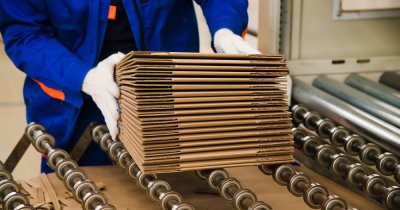We wrote about sustainable fashion here at Green Start-up before, in the form of reusing and recirculating with the Romanian online platform Vintello, and even discovered that some brands, such as Nike, include really neat sustainability efforts into their product line.
However, The Guardian reports that there are some manufacturers that want to take things further, and one of them is Daniel Rubin, founder of Dune, who with "alt leather" in mind, launched a new brand of trainers, called Lerins.
In the shoe lineup of the company, there is a 152 euros pair that is made of grapes skin left over from wine-making, with the goal to replace regular leather.
"Plant-based leather" promises to bring great benefits for the planet, and Lerins plans, through the new material, to disconnect from the cattle industry, effectively saving on the lives of animals while also avoiding greenhouse gas emissions.
Companies that might join the cause could upcycle the existing waste stream of fruits leftovers, such as grapes, apples, bananas and pineapples.
In fact, there are already a number of other brands that turned to plant-based leather for at least some of their products, most notably Hermès, Allbirds and Reformation.
Stella McCartney plans to launch grape leather shoes and bags in August, with a mushroom leather bag coming later this year.
Allbirds will launch some plant-based shoes as well, made of vegetable oil and natural rubber, and the products are expected "in due course".
Lab-grown leather is another new material that grabbed the attention of some investors, and recently, Leonardo DiCaprio and Kering, which is the parent brand of Gucci, Saint Laurent and Balenciaga, invested a "significant" amount of money in VitroLabs, a California-based lab-grown leather startup.
Lab-grown leather is obtained through cultivating animal stem cells in order to replicate animal hides, with the resulted leather supposedly being just as strong and long lasting as regular leather.
Dana Thomas, American journalist and author said that "we’re at a turning point. When I wrote Fashionopolis, this was in the testing phase, now it’s being rolled out commercially – it’s thrilling to see it happening.”
Nicole Rawling, CEO of the Californian charity Material Innovation Initiative, which attracts brands, researchers and investors for the development of next generation animal-free materials, says that last year her company was able to gather 980 million dollars-worth of funding to create alternative to animal-based materials, such as wool and silk.
The question regarding plant-based leather remains with consideration to their durability, since they are yet to prove themselves with regards to the test of time.
Dr. Laetitia Forst, postdoctoral researcher of sustainable fashion at the University of Arts, London says that "even if their initial impact is lower, if you’re having to replace them every year as opposed to every 10 years, their overall impact will be much higher."
The solution to make these leather alternatives more resistant was to coat them with plastic, polyurethane more specifically.
This process takes away from the sustainability part of things, which is why Lerins works with biomaterial company Vegea, which developed a water-based polyurethane that is supposedly "the most environmentally responsible polyurethane available."
At the same time, Allbirds claim that its plant-based leather is 100% plastic-free.
Nicole Rawling thinks that only through competing with one another will these companies be able to overcome the issues regarding the strength of the products and their eco-friendliness.
 Mihai - Cristian Ioniță
Mihai - Cristian Ioniță












Any thoughts?